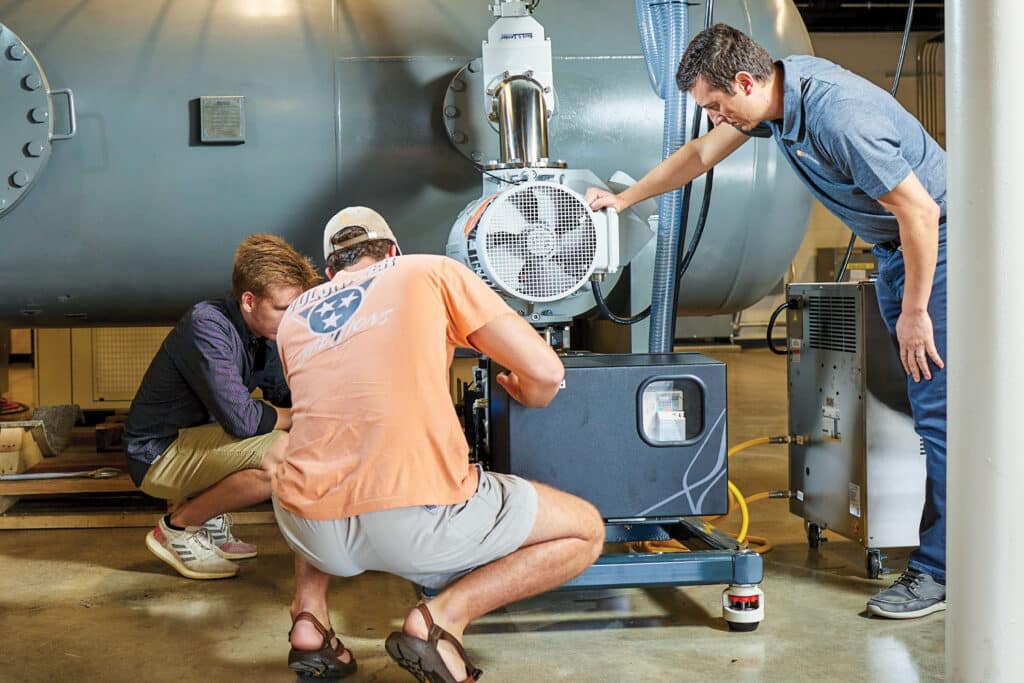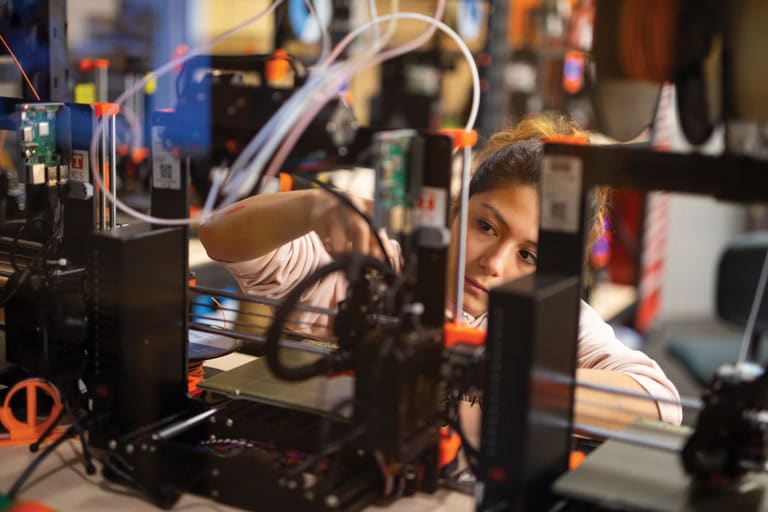
Aerospace Engineering, BS
From the smallest drones to the largest NASA rocket, if it flies then aerospace engineering was involved. Aerospace engineers are some of the greatest minds of today, playing an essential role in advancing technology, safety, and sustainability; our program equips students to succeed in such a high caliber industry, connecting undergrads to some of the biggest names in the field for sky-high academic and career potentials.
Program overview
Our aerospace engineering BS program consists of four main research thrusts: aerodynamics, propulsion, orbital mechanics, and stability/control. Students will participate in hands-on research and experiential learning within these main pillars, studying under some of the top engineering faculty in the country.
In addition to aerospace engineering courses, our department also hosts biomedical and mechanical engineering programs, allowing students from each of the three distinct disciplines to network and conduct interdisciplinary projects and research together.
Why Study Aerospace Engineering?
A BS in aerospace engineering opens the door to pursuing careers in industries like national security and defense, space exploration, air travel, and more. Our undergrad program provides a stepping stone for students to reach for their future in aerospace.
Industry Connections
We have faculty performing key research for NASA, the US Air Force, and Boeing, among many others, giving you opportunities to work alongside renowned organizations in the industry. Students will gain experience in manufacturing, testing, and design through internships and co-ops with companies and government agencies like Arnold Engineering Development Center, Lockheed-Martin, US Department of Defense, and more.
Research and Facilities
Students will participate in cutting edge research through our state-of the-art facilities like the Arcjet Wind Tunnel Flow Facility and Tennessee Aerothermodynamics Laboratory, gaining real world experience in a wide range of niche disciplines like fluid mechanics, mission planning, and aerodynamics of fibers. Access to our maker space that hosts an industrial water jet cutter, CNC machine, and professional-grade polymer and metal 3D printers provides hands-on experiences and collaborative opportunities.
What can you do with a BS in Aerospace Engineering after graduation?
Aerospace engineers are involved in the design, development, testing and production of aircraft, spacecraft, and related systems and equipment. They can work to design and improve missile systems for national security, develop satellites to monitor environments for emergency and disaster management, or drive development of new markets like space tourism for economic growth. But it doesn’t stop there.
Aerospace engineering jobs are available in industries like:
- Aerospace and Defense
- Space Exploration
- Aviation
- Government Agencies
- Manufacturing
- Unmanned Aerial Systems
- Urban Air Mobility
UT Alumni
Our program is proud to boast the success of our alumni who have gone on to be employed by NASA, Pratt and Whitney, and SpaceX, with nine NASA astronauts in our alumni ranks who have spent a collective of 1,000+ days in space.
Featured Courses
Below are some of the courses that students in our program can choose to take. For a list of all courses, visit the undergraduate catalog.
AE 370 Airplane Performance
Airplane aerodynamics, characteristics of propulsion systems, prediction of airplane performance, static and dynamic stability, and control of aircraft.
AE 351 Compressible Flow
One-dimensional internal flow with shocks, friction, and nonadiabatic conditions. Two-dimensional external flows.
AE 424 Astronautics
Solar system; orbital mechanics; propulsion; atmospheric entry, including thermal protection materials, human factors in space flight, the space environment, and current topics.
AE 460 Aerospace System Design
Synthesis and design of a complete aerospace system. Participation in team design effort including formal presentations and design report.
Complementary minors
Interested in pursuing a minor to expand your engineering expertise? See below for curriculum that would pair well with a BS in aerospace engineering:
Admissions and Aid
Choosing the right university to pursue an engineering degree is an important decision—and a significant investment. We want to make sure that you have the information you need to both apply and make attending UT affordable.


Ready to Join Us?
See yourself on Rocky Top? We’ve made it easier than ever to apply for admission. Learn more about our admission requirements and the steps to apply to be an Engineering Vol.
